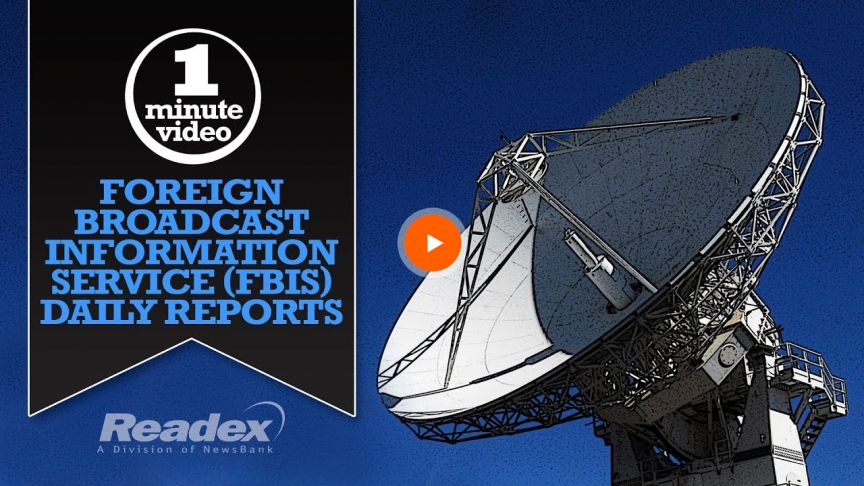
Foreign Broadcast Information Service (FBIS)
Daily Reports, 1941-1974
- A unique 20th-century archive for students and scholars of international studies, political science and world history
- Transcripts of foreign broadcasts and news, translated into English
- Helps researchers develop a layered understanding of the Cold War, the Soviet Union, China, the Middle East and Latin America
As the United States’ principal historical record of political open source intelligence for more than half a century, the Foreign Broadcast Information Service (FBIS) Daily Report is an indispensable source for insights into decades of turbulent world history. The original mission of the FBIS was to monitor, record, transcribe and translate intercepted radio broadcasts from foreign governments, official news services, and clandestine broadcasts from occupied territories. Accordingly, it provides a wealth of information from all countries outside of the U.S.—from Afghanistan to Zimbabwe.
FBIS Daily Reports, 1941-1974—an essential complement to FBIS Daily Reports, 1974-1996—is an indispensable source for insights into decades of turbulent world history. Full-text searchable for the first time, FBIS Daily Reports, 1941-1974 features individual bibliographic records for each Report and highlighted events to assist student researchers.
Translated materials form a distinctive English-language resource
Without translations, researchers must limit their research projects to primary sources in languages they understand or rely entirely on secondary sources. Translated as needed, these English-language materials—the vast majority of which originated in other languages—constitute a vital resource for students of international and area studies, political science and world history.
A wealth of media reports from every FBIS region
Digitized from original paper copy and high-quality microfilm, this definitive online collection— available exclusively from Readex—features full-text transcripts from Africa, Asia and the Pacific, China, Eastern and Western Europe, Latin America, the Middle East and the Soviet Union.
FBIS Daily Reports, 1941-1974 provides national and occasionally local perspectives on topics related to World War II and the Axis alliance, the new Islamic countries of the Middle East, the creation of Israel, the Berlin Wall, colonialism in Africa, apartheid, the Cold War, the Suez Crisis, the beginning of the Space Age, the Korean and Vietnam Wars, East-West interaction and much more. It also offers views on such figures as Salvador Allende, Fidel Castro, Winston Churchill, Ngo Dinh Diem, François Duvalier, Mohandas Gandhi, Adolf Hitler, Muhammad Ali Jinnah, Ruhollah Khomeini, Nelson Mandela, Imre Nagy, Joseph Stalin, Mao Tse-tung, Chaim Weizmann and many others.

Rare insight into geopolitics, global relations, political science and history
Essential Global Media, 1939-2001
Rare insight into geo-politics, global threats, foreign intelligence and more
“…two new products from Readex, via the meticulous translation work of the Joint Publications Research Service and the Foreign Broadcast Information Service, open our eyes to how Middle Eastern editors, journalists, and broadcasters viewed the events around them during the second half of the 20th century….
“Students of Middle East and North Africa history, politics, economics, and culture get an unfiltered view of the events of this intensely active region during the second half of the 20th century thanks to Middle East and North Africa: Global Perspectives, 1958–1994, and the companion product Part 1: Middle East, Africa, Near East and South Asia—one of eight distinct area subsets of the complete collection of Foreign Broadcast Information Service (FBIS) Daily Reports, 1974–1996….JPRS and FBIS translations are regarded as accurate and scrupulously unbiased.
“….both products stand apart from similar offerings, approaching unique and fascinating content on issues and events in the Middle East with perspectives that are not represented in other databases.”
— Gail Golderman and Bruce Connolly, “Reference eReviews,” Library Journal (July 2017)
“Highly recommended. Academic libraries supporting strong graduate programs in history and political science; upper-level undergraduates through faculty/researchers.”
—L.E. Lyons, Northwestern University, reviewing FBIS, 1941-1974, in Choice(September 2013)
“For nearly 70 years, the Foreign Broadcast Information Service (FBIS) monitored the world’s airwaves and other news outlets, transcribing and translating selected content into English and in the process creating a multi-million-page historical archive of the global news media. Yet, FBIS material has not been widely utilized in the academic content analysis community, perhaps because relatively little is known about the scope of the content that is digitally available to researchers in this field....”
— Kalev Leetaru, “The Scope of FBIS and BBC Open-Source Media Coverage, 1979–2008” in Studies in Intelligence (March 2010)
“This searchable, online archive [Foreign Broadcast Information Service (FBIS) Daily Report, 1974-1996] contains hundreds of thousands of pages of foreign press materials, news transmissions and radio broadcasts....When you first enter the site, you are presented with a standard search box, which you can filter by date, country or region, type of document, publication title, or a specific event. This last option is particularly useful when keyword searching would be imprecise....an extensive collection of primary materials which can be used to study not only modern historical events, but also the perception and portrayal of those events around the world. While more advanced researchers of these regions will likely have the language skills to view this material in its original form, having certified translations of these broadcasts and periodicals can provide undergraduates a way to access the material with fewer secondary filters. Furthermore, the breadth of material leaves little doubt that this collection will be an invaluable resource to seminar tutors of world and regional history as well as undergraduate students working through honours dissertations.”
—Reviewed November 2009 by Dr Melodee Beals, Academic Coordinator, History at the Higher Education Academy
"By digitizing this collection of FBIS Daily Reports, Readex has made available a set of material for the second half of the twentieth century that offers a foreign perspective vital to students and scholars for this time period. The database is recommended for all academic libraries and research collections, especially those in political science and world history."
—Suzanne L. Holcombe, Associate Professor, Documents Librarian, Edmon Low Library, Oklahoma State University in Reference Reviews (Fall 2009)
"Scholars once had to travel to far-flung destinations to gather primary sources. With the increasing amount of digitized content on the Web, they now can search through historical newspapers and broadcasts at the click of a mouse. Originally used by government and military officials, the Foreign Broadcast Information Service, a component of the CIA, was formed in the 1940s. It translated foreign countries' television, radio, and print media content, as well as public speeches and press releases, into English from over 50 languages. This online database from Readex is a searchable collection of the original print-based FBIS Daily Reports. From the database home page, users can choose to search across the entire collection, or target their searches to specific geographic areas. The user-friendly world map helps researchers narrow searching to specific countries of interest. The current collection spans the mid-1970s to mid-1990s and includes over two million articles. The content covered within these years is beneficial to scholars studying post-WW II events, particularly decolonization, emerging democracies, and communism.
"Summing Up: Recommended. Academic libraries supporting strong graduate programs in history and political science; upper-level undergraduates through faculty/researchers."
—J. A. Hardenbrook, Millikin University, reviewing FBIS, 1974-1996, in Choice (December 2008)
"Foreign Broadcast Information Service (FBIS) Daily Report, 1974-1996, released by Readex in 2007, is an electronic collection of the daily reports originally issued by FBIS in paper and microform. The reports include selected news bulletins and editorials, speeches, briefings, interviews, and policy papers gleaned from radio and television broadcasts and news services in approximately 100 countries throughout the world. Collected and translated into English by the Central Intelligence Agency, the texts are largely from sources in regions of American strategic interest during the period.
"Much of the content originated from local broadcast stations, some of them 'clandestine.' shortwave radio operations....The collection also includes CIA transcripts of news reports filed through foreign bureaus of Western news agencies and broadcasters such as the BBC World Service and Agence France-Presse....
"The Readex product begins in 1974, when the reports began to be published on microform, and continues through 1996, when the printed reports were discontinued. This was a time of great political upheaval and major changes in international alignments. The collection covers the last years of the Cold War, turmoil in the Middle East, struggles for liberation ill Africa, and the emergence of China and India as world powers. Since the original purpose of the reports was intelligence, to enable U.S. government agencies and military to monitor events and developments in countries of strategic interest to the U.S., the present series is particularly rich in materials from Southeast Asia, China, the Middle East, and key African nations like South Africa, Angola, and Kenya....
"While news reports, particularly broadcasts from zones of conflict and instability, are notoriously unreliable as fact, they afford unique insights on the views of the governments, opposition parties, and governments-in-exile that often controlled the media outlets in those parts of the world. The FBIS Daily Reports, 1974-1996 is one of the few sources of these kinds of materials. The archives of television and radio stations, particularly clandestine operations, simply do not survive in most instances. They are often lost or are not maintained in the first place, particularly in areas of chronic conflict, such as the West Bank and Afghanistan....
"...an outstanding and unique collection....includes extensive coverage of broadcast and news reports from emerging nations and conflict zones....Navigation and search are intuitive and enable users to easily pinpoint materials of interest."
—Bernard F. Reilly, Jr., President of the Center for Research Libraries in The Charleston Advisor (October 2008)
“The definition between government document and nongovernment document blurs, particularly as the intelligence tentacles of the United States government seek every shred of information, news, detail—and bring it home for contemplation, digestion and eventual redistribution....
“Prime examples of the ‘documentization’ of information are the United States Joint Publications Research Service (JPRS) and its equally acquisitive partner, the Foreign Broadcast Information Service (FBIS)....Of interest here are the transforming effect these services have on the information they amass and the research and societal value that results.
“The significance of information collected by JPRS and FBIS is enormous. Of greatest importance is the diversity of viewpoints suddenly made accessible by subject and in English. To be able to understand these resources in relation to their special provenances is especially critical in appraising their informational value.
“FBIS, for example, literally provides an ear to the rest of the world through the collection and translation of radio news and editorial broadcasts....
“JPRS provides equally important access to foreign newspapers, books, technical reports, and other printed materials. The significance may not end with the simple fact of convenient availability, but rather with the status accorded this information as newly created government documentation. That much of this material contradicts claims of the United States government (the very authority which, by virtue of its collection of these materials, gives them, in certain circumstances, greatly augmented validity) is an appropriate irony to be savored....
“Information acquires meaning when it can be used. The format of the material matters little; content should be the critical factor. Librarians have this opportunity to contribute to and participate in the evolution of meaning.”
— Glenda J. Pearson, “Government Publications on Microform: Integrated Reference Services,” in Microform Review (Dec. 1988)
“Foreign Broadcast Information Service (FBIS)….provided immense amounts of information that were vital to shaping our understanding, not only of Russia, but of China, the Middle East, Africa, Latin America, etc.…FBIS played a major role in educating an entire generation of US-trained specialists on Russia and the region in their efforts to learn more about the closed society of the Soviet Union, which significantly enhanced our ability to understand the USSR and the former captive nations of Eastern Europe.”
— The Hill, Congress Blog, Feb. 18, 2016
“Indeed there was an entire branch of CIA which monitored and published on a daily basis a thick booklet of selected broadcast items from around the world—available by subscription. The Foreign Broadcast Information Service provided an invaluable service. It is now sadly defunct, the victim of short-sighted budget cutting—an operation which probably cost less annually than one fighter aircraft and offered much more.
“One virtue of these broadcast items was the nuggets of domestic information from those countries which were otherwise not readily known about—a kind of news coverage. But the greater value was the ability to see how a foreign state viewed itself and the world around it. Propaganda? Sure, in one sense. But the thoughtful reader could fairly soon get a sense of how Russia, China, North Korea, or say Iran, saw themselves. Sometimes you might find a strikingly different interpretation of events that revealed a lot about their psychology and even their likely reactions and behavior down the road.
“For the thoughtful statesman and analyst, this was good stuff. It helped explain where other leaders were coming from, what they more or less believed. Their worldview also offered perspectives about how they saw the U.S. Whether we liked it or not, it contained a few revelations about our mutual, and differing, perspectives.”
— Graham E. Fuller, former senior CIA official, in “Value in Reading Others’ Propaganda,” published on Consortium News.com (Sept. 29, 2015)
"Scholars and students in an increasingly globalized world must engage with the history and cultural perspectives of other countries. The FBIS Daily Report is a crucial resource for those seeking to understand events from other countries' standpoints. Digitization of the Daily Report will dramatically expose the breadth and depth of this unique material."
— Julie Linden, Government Information Librarian, Yale University Library
"Heavily used by students and faculty, the FBIS Daily Report enables researchers to use foreign language primary sources, including newspaper articles, transcripts of radio and television interviews, intercepted clandestine radio broadcasts and more. Many researchers do not know all of the foreign languages necessary to follow news reports in the native languages of all of the countries they might wish to study. Because FBIS Daily Report provides consistently reliable English translations from the original sources in dozens of languages, students and faculty have expanded research opportunities. Without FBIS, researchers would have to rely entirely on secondary sources or to limit their research projects to primary sources in only those languages in which they are fluent. And even if a student is fluent in the language necessary to follow news reports in a particular country, many libraries do not subscribe to many of the news sources from which the FBIS reports are taken.
"An online edition of FBIS Daily Report—offering full text, consistently reliable English translations from the original news reports in dozens of languages from every region of the world—presents broad new opportunities for students shaping their research topics. The capability to perform full text searches of a resource previously available only in microform will open up years and years of information from foreign news sources that may not have been used before because of the effort required to access the material. This exciting resource provides access to primary source material of critical international importance and to the students and scholars researching diverse aspects of our global society. We eagerly await this digital product by a company known for scholarly excellence."
— Donna Koepp, Head of Government Documents and Microforms and Head of Reference and Instructional Services, and John Collins, Reference/Documents Librarian, both Harvard College Library
"An invaluable resource for scholars of international affairs. It is the premier collection of translated foreign press available in English."
— R. William Ayres, Ph.D., Director, Center for Global Citizenship and Associate Professor of International Relations, Elizabethtown College
"For decades, FBIS has been indispensable for all serious students of international politics. The new online searchable edition opens new avenues for important research in the social sciences and humanities."
— Robert A. Pape, Professor of Political Science, University of Chicago and author of Dying to Win: The Strategic Logic of Suicide Terrorism (2005)
"Using FBIS documents plunges the scholar and student directly into those moments in which history is made. Many of these materials are literally transcripts of events as they occurred, right down to parenthetical asides: "Gunfire heard in background" of a Ghanaian radio news program in progress as the station was stormed in an attempted coup.
"FBIS brings to the mind's eye what on-the-spot video does now: it makes the events of the last half of the 20th century come alive, as well as guarantee that firsthand descriptions will survive to tell the tale even after events have been deconstructed, re-assembled and interpreted according to the prevailing political and historical theories of the day."
— Glenda Pearson, Human Rights Librarian, University of Washington Libraries
"I am very excited to learn that the Foreign Broadcast Information Service's Daily Report will soon be digitized. In the past I have utilized this excellent source not only for the more recent broadcasts surveyed in 'Palestinian Radio and the Intifada' but also those from the 1950s and 1960s included in 'The Algerian War of Words: Broadcasting and Revolution, 1954-1962.' While I remember fondly countless hours spent reading the microfilm and microfiche versions, a searchable online version of the FBIS Daily Report will prove to be even more invaluable to future researchers."
— Robert Bookmiller, Ph.D., Director of International Studies and Associate Professor, Department of Government and Political Affairs, Millersville University of Pennsylvania
"Readex's digitized edition of the FBIS Daily Report will be essential for today's international and government information researchers. Comprehensive electronic access to the FBIS translations in English of worldwide daily broadcasts, news and government statements is unprecedented. Scholars, students, policymakers, citizens—anyone concerned with globalization, politics and culture—will be thrilled to use such an incredible interdisciplinary online resource."
— Mary Mallory, Head, Government Documents Library, and Associate Professor of Library Administration, University of Illinois at Urbana-Champaign
Stay in Touch
Receive Readex news, invitations, and special offers
Sign UpBy clicking "Sign Up", you acknowledge that you have read and understand our Privacy Policy and Terms of Use.






